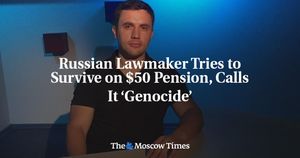On February 7, 2025, President Donald Trump signed an executive order halting U.S. financial assistance to South Africa, citing the country's recently passed land expropriation law and its role in bringing accusations of genocide against Israel to the International Court of Justice (ICJ). The executive order, which impacts approximately $440 million allocated for 2023, marks a pivotal moment in U.S.-South Africa relations and highlights growing global divisions on land reform and human rights issues.
The decision to freeze aid was formally justified by the White House, stating, "The United States cannot support the government of South Africa’s commission of rights violations..." It continues by emphasizing the urgency of addressing the situation, especially for the white minority population affected by the land seizure policies. Trumps's executive order states: "South Africa is confiscation land, and treating certain classes of people VERY BADLY," framing the order as part of his broader 'America First' foreign policy agenda.
The contentious Expropriation Act, endorsed by South African President Cyril Ramaphosa, empowers the government to confiscate land under specific conditions, thereby addressing historical wrongs from the apartheid era. Yet, Trump's administration claims this law targets the Afrikaners, predominantly white landowners, without offering compensation. The White House noted, "We will also promote the resettlement of Afrikaner refugees" as part of the order, indicating a move toward offering sanctuary to those affected.
Despite these claims, President Ramaphosa defended the Act, stating, "We will not be bullied" and reaffirming the necessity for redistribution to rectify racial disparities. A 2017 land audit revealed stark inequalities: white South Africans, who represent only 7% of the population, possess nearly three-quarters of the country's farmland, whereas Black South Africans, who constitute over 80%, own merely 4%.
Trump's actions have been seen by many as aligned with far-right narratives, which have perpetuated conspiracy theories of 'white genocide' in South Africa. Notable Trump supporter Elon Musk, who has echoed similar sentiments, tweeted, "They are openly pushing for genocide of white people in South Africa," amplifying contentious perceptions surrounding the Expropriation Act.
Alongside the land policy issues, South Africa's legal actions against Israel have inflamed tensions. The country has accused Israel of committing genocide, particularly highlighting casualties from the latest military responses to Hamas, exacerbated by conflicts stemming from the attack on October 7, 2023. This prompt has raised eyebrows within the U.S. administration, which has long been allied with Israel and views the case as retreating from its foreign policy ideals.
Responses from the international community have been mixed. Far-right organizations within South Africa have welcomed the aid freeze, asserting it affirms their grievances concerning land ownership and historical injustices. Conversely, leaders from various political spectrums within South Africa have condemned Trump's perceptions, framing them as misinformed and indicative of misunderstanding the nation's complicated socio-political history. For them, land reform is more about justice and rectifying colonial legacies than discriminatory policies.
The executive order's economic fallout extends beyond just financial assistance. A significant portion of this aid has historically funded health initiatives, particularly efforts against HIV/AIDS and tuberculosis. The withdrawal could hinder progress made toward public health improvements and exacerbate existing health crises among vulnerable populations.
Given South Africa's participation within the African Growth and Opportunity Act (AGOA), the aid freeze also raises questions about future trade relations and economic cooperation between the two nations. The situation is fraught with uncertainty: how will South Africa respond economically and politically to the aid freeze? Will diplomatic ties continue to strain as each side fails to yield on these contentious issues?
The prospect of future aid to South Africa now hangs precariously as both leaders refuse to back down. This impasse not only disrupts bilateral relations but also fortifies political sentiments within both nations. On one hand, Trump's administration reinforces its commitments to certain ideologies, and on the other, South Africa stands firmly behind its sovereignty.
Internationally, reactions have included vocal support for the ICC from entities like the European Union, which condemned Trump's actions as undermining global institutions aimed at promoting human rights. For many observers, Trump's executive order seems not just to be about aid; it's symptomatic of wider geopolitical currents influencing the modern state of global diplomacy.
What lies next for U.S.-South Africa relations remains unclear, but what is evident is the intention behind Trump's latest moves is stirring division and conversation on ethics, justice, and economic health. With growing scrutiny and national interest at stake, both countries face significant challenges as they navigate this increasingly complex diplomatic standoff.



